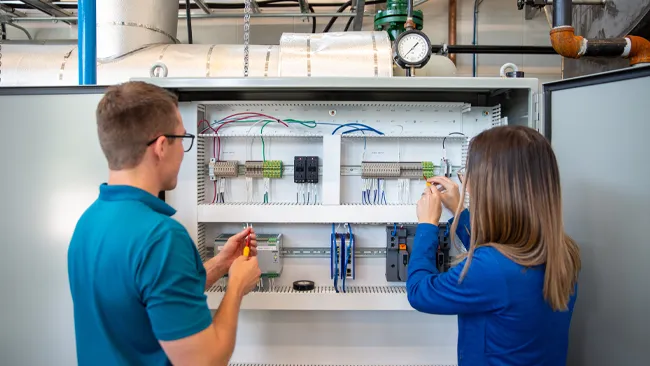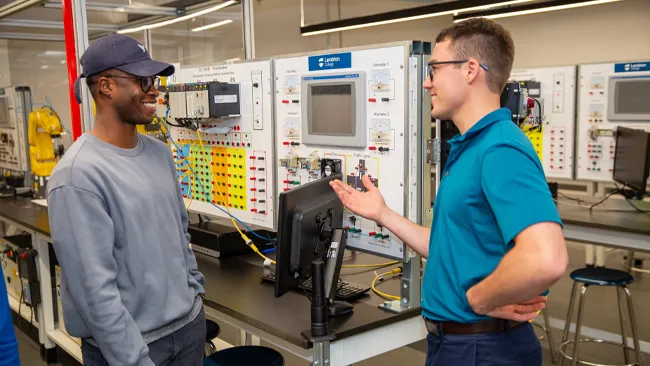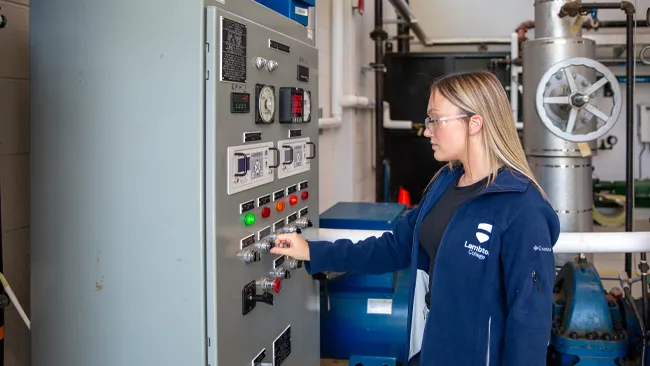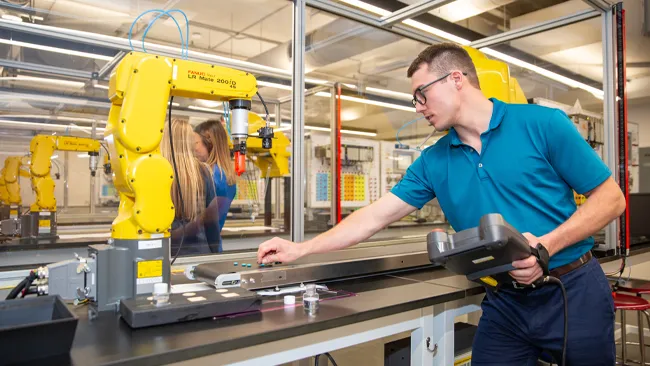An Instrumentation & Control Technician installs, maintains, calibrates, designs, and troubleshoots networking systems, process control, and environmental protection equipment in a variety of industrial environments.
This program follows the current curriculum set out by Skilled Trades Ontario.
Apprentices in this program work in many industries that require any type of automation. All companies require some form of automation control which makes the opportunities for highly trained instrumentation control and control technicians abundant.

Training
The Instrumentation & Control Technician apprenticeship program consists of on-the-job and in-school training. The program typically takes five years to complete and consists of:
- 7,280 hours of on-the-job training and work experience
- 720 hours of in-school training
Red Seal Exam
At the completion of the in-school portion of the apprenticeship, graduates are given a week of preparation before they write the Red Seal exam for the trade.
Our students may write this exam at the College at the end of the training, or book a separate time to write the exam at the MLTSD office.
What does an Instrumentation & Control Technician Do?
Admission Requirements
To be eligible for this program, applicants must:
- Have a sponsor or employer and must be registered through the Ministry of Labour, Training & Skills Development
- Have a minimum Grade 12 high school education or equivalent
- Be at least 16 years of age
Application Process
This is an apprenticeship program and follows a different application process than regular post-secondary education programs. You cannot apply to this program through ontariocolleges.ca.
Applicants who are registered as an apprentice in a trade should receive a letter from the Ministry of Labour, Training & Skills Development inviting them to apply for schooling. All applications from that point will need their payment processed by the Office of the Registrar & Financial Aid Services at Lambton College.
If you are a registered apprentice and have not received a letter regarding apprenticeship school, please contact your local Ministry of Labour, Training & Skills Development office.

Training Dates
The following training dates are for the 2023-2024 academic year for the Instrumentation & Control Technician apprenticeship.
- Basic (ICTB) Dates
- TBD
- Intermediate (ICTI) Dates
- TBD
- Advanced (ICTA) Dates
- TBD
Course List
Applied Trade Practices
Upon successful completion the apprentice is able to explain relevant safe work practices, policies and procedures as well as trade standards and codes according to government safety regulations, manufactures recommendations and approved industry standards. The apprentice will also be able to describe the construction and application of tools and equipment used in instrumentation and the safe use of them including proper lock-out and tag-out procedures.
Electrical Theory & Calculations I
Upon successful completion the apprentice is able to assemble, analyze and troubleshoot electrical circuits, applying mathematical tools and using electronic test equipment and describe electrical fundamentals.
Electrical Systems I
On successful completion the apprentice is able to assemble, measure and troubleshoot basic semi-conductor and logic gate circuits using electronic test equipment according to government regulations relevant to the instrumentation and control trade.
Computers & Documentation
Upon successful completion the apprentice is able to describe and use computer software to create process and instrumentation (P&I), wiring and loop diagrams; and to produce computerized presentations and technical documentations by incorporating information from multiple sources.
Instrumentation I
Upon successful completion the apprentice is able to identify and explain the principles of operation and calibrate temperature, pressure, level and flow measurement instruments by applying theory and performing laboratory experiments. The apprentice will also be able to install instruments and control systems according to government regulations, manufacture's recommendations and approved industry standards.
Electrical Theory & Calculations II
This course covers the explanation of electrical theory and magnetic theory as applied to AC motors and generators, DC motors and generators, and magnetic devices. Topics will include properties of magnets, principles of capacitance, principles of induction, construction and operating principles of AC motors and generators, construction and operating principles of DC motors and generators, and the characteristics of resistive inductive capacitive (RLC) circuits. This course covers explanations of Ohm's, Lenz's Law, and Fleming's right hand rule.
Instrumentation II
This course covers the explanation of instrument testing, calibration, installation, operation, and measurement. This course will include explanations of Charles's, Pascal's, and Boyle's gas laws. Topics covered by this course will include pressure, level, temperature, flow, and secondary process measurements.
Instrumentation Controls I
This course covers the explanation of solenoid valves, on/off control systems, proportional, integral, and derivative control (PID) systems, valve positioners, and common control valve problems.
Discrete Control
This course covers the explanation of discrete controls (input / output devices), control system electrical schematics, and discrete control wiring. Topics will include the operation and control wiring of input devices: limit/reed switches, selector switches, control relays, temperature switches, pressure switches, level switches, pneumatic timers and output devices: starters, solenoids, and relays.
Computer Controls Systems
This course covers explanations of DCS, PLC and Scada systems, electric circuits and ladder diagrams, configuration, programming and troubleshooting of computer control systems, as well as computer interfacing and communication.
Applied Circuits
This course will cover an explanation of the operating principles of solid state devices, as well as interpretation of manufacturer's diagrams. Through this course the apprentice will become proficient in the installation, testing and troubleshooting of power supplies, switching devices, and final control elements.
Programmable Logic Controller
This course will cover the selection, installation and programming of programmable logic controllers and distributed control systems. Through this course the apprentice will become proficient in the installation, testing and troubleshooting of PLC/PLC systems.
Instrumentation & Controls II
This course will cover an explanation of computer control and data transfer methods. Through this course the apprentice will become proficient in the assembly, tuning and testing of control system components as well as troubleshooting common problems in these systems.
Analytical Instrumentation
This course will cover an explanation of the principles and operation of different analyzer systems. Through this course the apprentice will become proficient in the calibration and maintenance of analyzer systems.
Fluid Power Systems
This course will cover an explanation of the operating principles and applications of hydraulic and pneumatic systems. Through this course the apprentice will assemble and test fluid power systems.

This Employment Ontario program is funded in part by the Government of Canada and the Government of Ontario.
Contact Us
Applied Science, Engineering Technology & Trades





